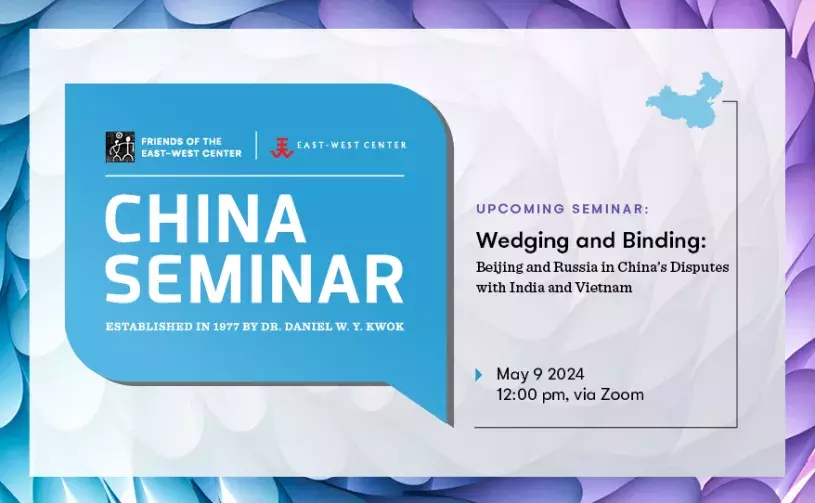
OFFICE/DEPARTMENT
Add to Calendar
Speaker's summary:
Is Russia becoming a Chinese “vassal” as many Western politicians and pundits claim? Will or can Beijing leverage its growing influence over Moscow to gain stronger Russian backing in China’s territorial disputes with India and Vietnam, both of which have close partnerships with Russia? This study challenges these prevailing views and instead argues that China has adopted a bifurcated approach toward Russia’s role in the context of China’s territorial dispute with India and Vietnam in the post-Cold War era. Driven by a logic of indirect wedging, China has exercised caution in seeking Russia’s support in its dispute with India. In contrast, the logic of binding has made Beijing less reluctant to pressure Moscow regarding the maritime dispute with Vietnam. This study contributes to the existing literature on wedging and binding, and sheds new light on how the US Indo-Pacific strategy could more effectively safeguard America’s interests.
Speaker's Bio:
Dr. Shuxian Luo is an assistant professor in the Department of Asian Studies at the University of Hawai‘i at Mānoa, and a non-resident China Fellow at the Woodrow Wilson International Center for Scholars. Her primary research interests include Chinese foreign and security policies, maritime security in the Indo-Pacific, and crisis management in US-China relations. Her work has appeared in peer-reviewed journals such as Asian Security, Contemporary Southeast Asia, Journal of Contemporary China, among others, as well as in policy publications such as War on the Rocks and The Diplomat. Dr. Luo has briefed officials and staff at the State Department, US Congress, and UK Cabinet Office. She received her BA in English literature from Peking University and PhD in international relations from Johns Hopkins University School of Advanced International Studies (SAIS).
The views expressed are those of the speaker and do not necessarily reflect East-West Center policies or positions.
Speaker's summary:
Is Russia becoming a Chinese “vassal” as many Western politicians and pundits claim? Will or can Beijing leverage its growing influence over Moscow to gain stronger Russian backing in China’s territorial disputes with India and Vietnam, both of which have close partnerships with Russia? This study challenges these prevailing views and instead argues that China has adopted a bifurcated approach toward Russia’s role in the context of China’s territorial dispute with India and Vietnam in the post-Cold War era. Driven by a logic of indirect wedging, China has exercised caution in seeking Russia’s support in its dispute with India. In contrast, the logic of binding has made Beijing less reluctant to pressure Moscow regarding the maritime dispute with Vietnam. This study contributes to the existing literature on wedging and binding, and sheds new light on how the US Indo-Pacific strategy could more effectively safeguard America’s interests.
Speaker's Bio:
Dr. Shuxian Luo is an assistant professor in the Department of Asian Studies at the University of Hawai‘i at Mānoa, and a non-resident China Fellow at the Woodrow Wilson International Center for Scholars. Her primary research interests include Chinese foreign and security policies, maritime security in the Indo-Pacific, and crisis management in US-China relations. Her work has appeared in peer-reviewed journals such as Asian Security, Contemporary Southeast Asia, Journal of Contemporary China, among others, as well as in policy publications such as War on the Rocks and The Diplomat. Dr. Luo has briefed officials and staff at the State Department, US Congress, and UK Cabinet Office. She received her BA in English literature from Peking University and PhD in international relations from Johns Hopkins University School of Advanced International Studies (SAIS).
The views expressed are those of the speaker and do not necessarily reflect East-West Center policies or positions.









